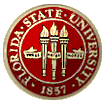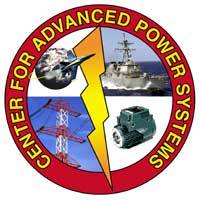






Group
#12
Team
Members:
Russell
Hopson
Frederick
L. McPherson
Date:
January 11, 2001
The Florida State University, FAMU-FSU College of Engineering, and the National High Magnetic Field Laboratory established the Center for Advanced Power Systems (CAPS). This center was formed shortly after the U.S. Office of Naval Research awarded Florida State University a 3-year $10 million grant to establish a center that will support the Navy’s all-electric ship program. The Navy views this collaboration as an opportunity to create a more technology advanced military through an advanced fleet. The fleet will be more affordable, require less maintenance, less manpower, and include more automation, design and operations flexibility. The new electric ship with electro-mechanical systems is easier to upgrade in technology, an advantage over the current Nimitz class destroyers and aircraft carriers that feature electrical, mechanical, and hydraulic systems that are expensive to maintain and hard to replace.
The focus of CAPS is to develop resources needed to implement Systems Driven Strategy focused on high-level systems issues involving power distribution, system control, performance and component systems of power systems seen in advanced transportation power systems. CAPS will function as a link for government and industry, which will work together to create new, advanced power systems that possess optimal reliability & flexibility, performance, power and energy density.
The underlying problem for this new emerging technology is that there is not enough students involved in the research of this technology, creating a shortage of engineers with knowledge in this area of industry. This could hinder the expansion of this technology if not addressed. CAPS have presented this senior design group with the task of creating a technology assessment group comprised of students and a minimal amount of faculty.
The CAPS mission
has four thrusts:
· Develop a multidiscipline program for graduate and undergraduate education in power system engineering.
· Develop research programs strongly focused on simulation and modeling of advanced power systems supported by test facilities, materials research and superconductivity technology.
· Develop strong partnerships between government, industry, and academic research community.
· Advance the state-of-the art electric power technology through identifying and developing “dual use” opportunities.
The first two thrusts are the needs that must be fulfilled by this senior design team. This new organization of students geared towards assisting the CAPS program and fulfilling these objectives has been given the name CAPS-SO. CAPS-SO is an acronym for Center for Advanced Power Systems- Student Organization. Within these two needs stated by the sponsor, there are other needs that have been identified and must be satisfied in order to meet the expressed needs of the sponsor. The other needs can be classified by three categories: Program Setup, Program Interest, and Research. The needs can be viewed in the following outline.
A. Research Center must have it’s own facility in Innovation Park.
B. Center must have temporary site in engineering school facility until the Research Center is constructed.
C. Research Center Interim setup needs minimal operating budget and equipment.
1. Computers
2. Cubicles
3. Phones and Fax machines
4. Petty Cash
5. Access Keys / Cards
D. Research Center Operations Manual
1. Student Group constitution
2. Student Group rules and regulations
3. Facility security procedures
E. Signing of non-disclosure forms
A. Advertise and Promote the organization and its advantages for students
1. Information Sessions
2. Brochures
3. Web Page
B. Create in-class incentives for participants in research
1. Projects through Multidisciplinary Design Center
2. Extra-Credit Assignments affiliated with organizational objectives
C. Develop relationships with research partners for possible employment opportunities
1. Contacts Books
2. Student / Professional cooperative assignments
D. Provide “Hands-On” training and projects for students
E. Coordinate plant trips and tours.
A. Meaningful Projects
B. Projects that are reaching the Navy’s goal of an all electric ship
C. Projects that involve the application of:
1. Superconductivity
2. High strength permanent magnet materials
3. Power semiconductors
4. Control technologies
D. Projects for leading system candidates for advanced technologies
1. High speed rail magnetic levitation system
2. Magnetic assisted launch for both aircraft and spacecraft
3. Other various spacecraft and aircraft systems
E. Run feasibility studies for the Navy
1. Gather technology information
2. Gather vendor data
3. Gather cost data
4. Perform economic trade-offs
F. Determine which companies would be best suited to develop and manufacture components
G. Develop several patent quality electromagnetic devices
The goal of this group for the remainder of the semester is to acquire office space and have at least six other students willing to participate in research at the start of next semester. The way CAPS-SO plans on attracting other students could possibly include giving presentations, putting up advertising flyers, directing students to the CAPS-SO website, and advertising through other student organizations. Possible projects for next semester will be determined later in the semester and selected according to level of importance and level of student support. Also, the temporary office space will be outfitted with computers, cubicles, and telephone lines to be functional for use by the beginning of the spring semester.
As with any startup operation there are many logistical issues that must be dealt with to have a legitimate chance of overall success. The Scope of the CAPS-SO team is broad, yet specialized in that it deals with a definite range of applied action. The initial goal is strictly to give a sturdy foundation and setup for the CAPS-SO organization, which will hopefully, be in existence far beyond the completion of the CAPS program. This includes equipment, office space, and a firm plan of action for future projects. As long as diligence as observed and each plan is executed, there is no reason to prevent the Center for Advanced Power Systems- Student Organization (CAPS) to become a self-sufficient entity with the Center for Advanced Power Systems (CAPS).